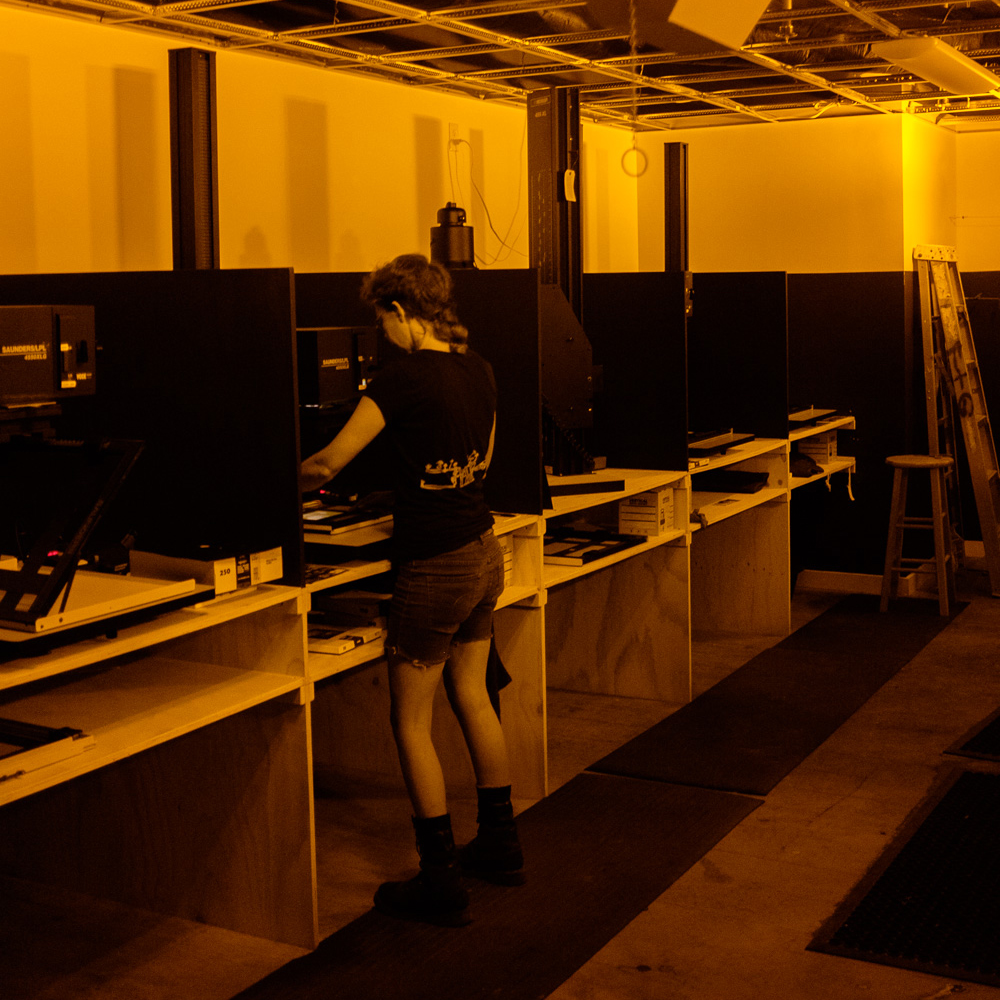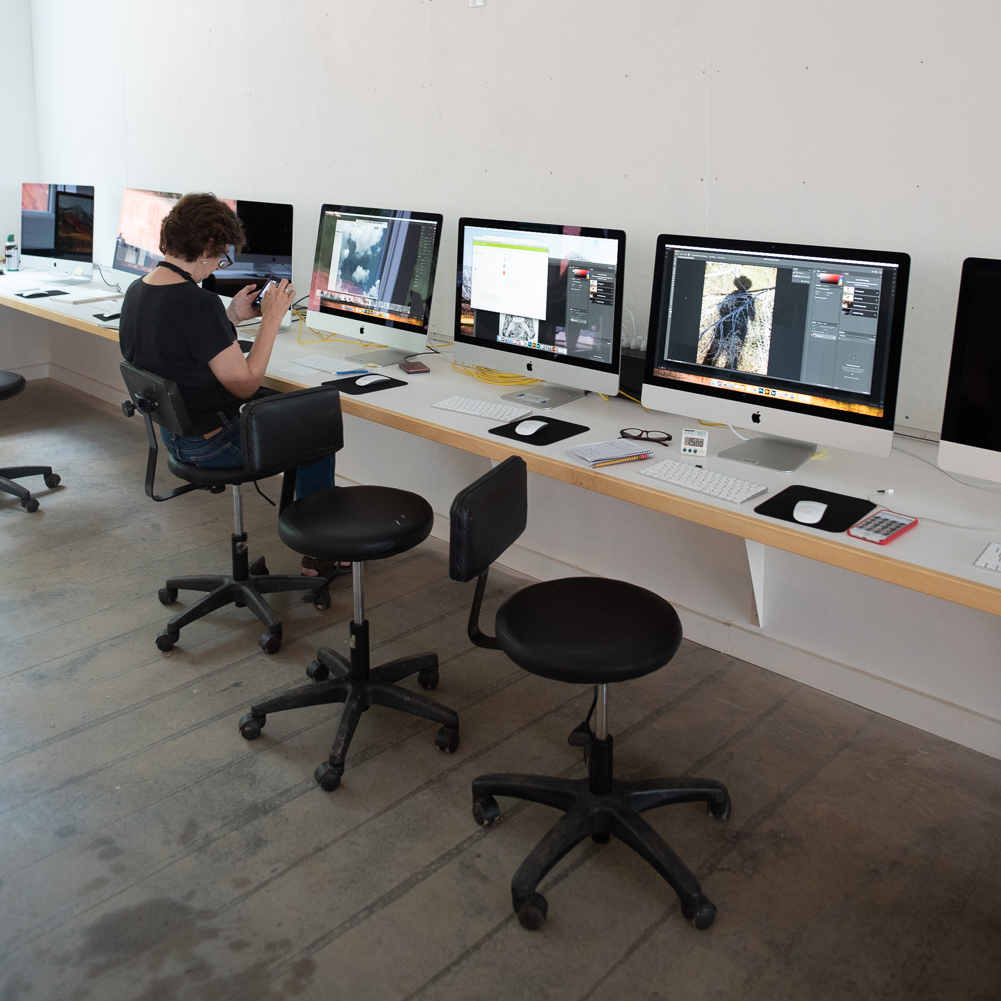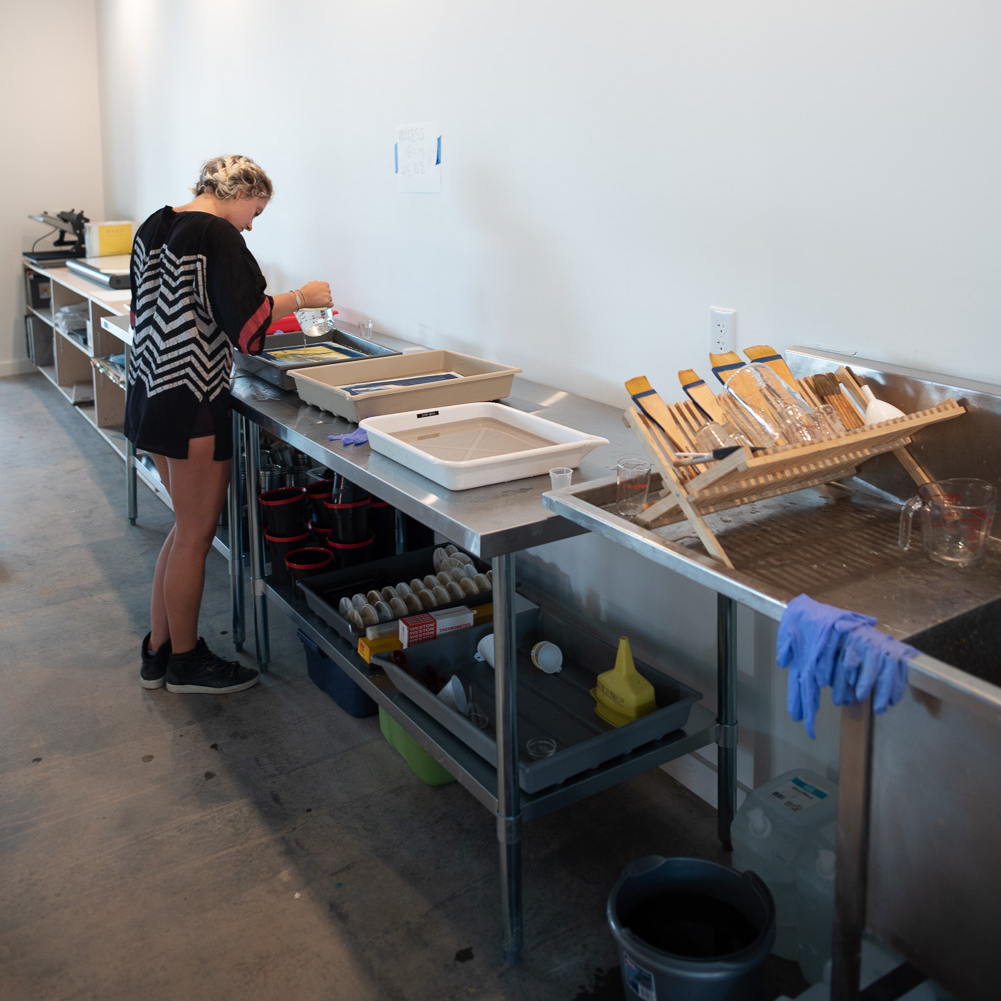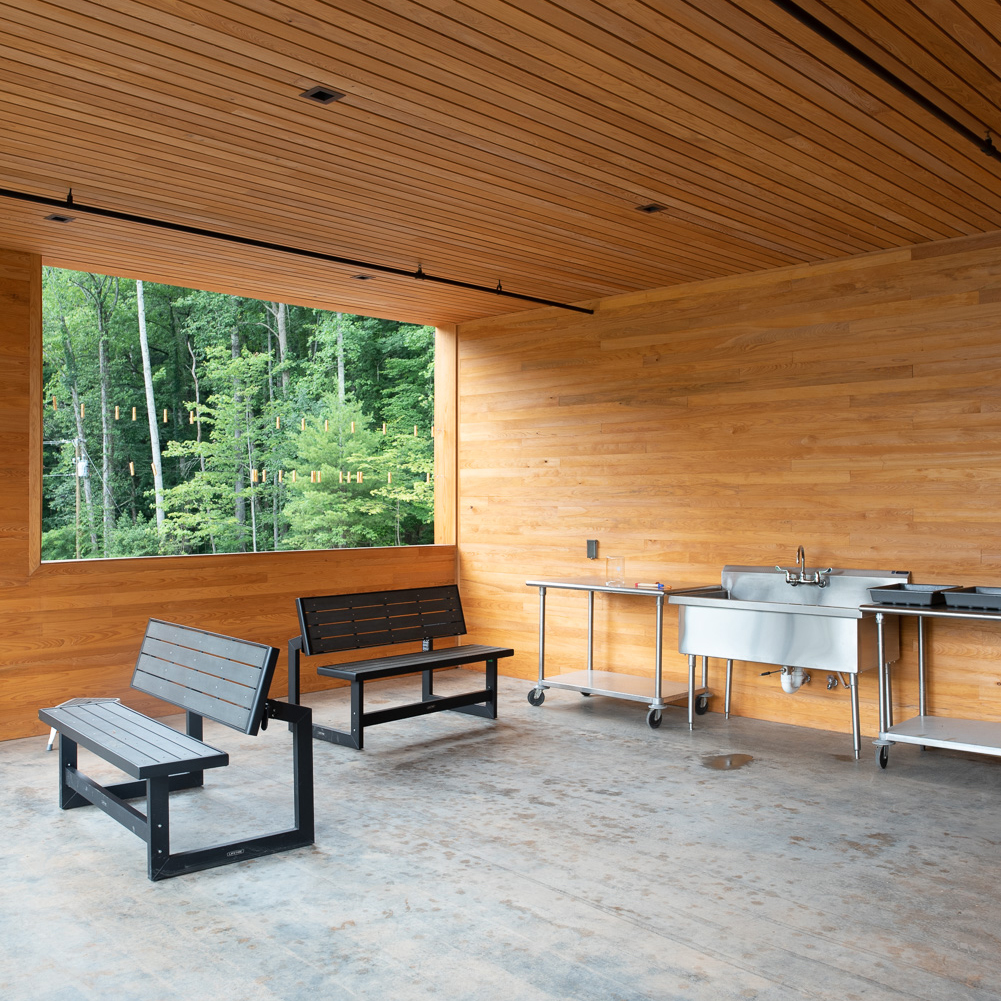Penland Photography Program

The Penland photography program offers beginning to advanced workshops in traditional and contemporary methods. The photography studio provides the space and equipment to explore image-making and photography through the lens of material and craft, via work in digital, video, and film-based formats. The technical and conceptual scope of each workshop is determined by the instructor with input from our program director and support from our programming staff. Our versatile facility and high caliber visiting artists/educators allow us to provide relevant programming in topics from portraiture to mixed media assemblage and everything in between. We strive for a balance of technical and aesthetic content and value all cultural and historical perspectives. We offer workshops that inspire and challenge students from curious beginners to accomplished professionals. Our programming is current in spirit and respectful of craft traditions.
The photo studio is very flexible, but particularly well equipped for historic and contemporary darkroom and digital photography processes. The range of workshop topics includes but is not limited to film developing and fine printing; 19th-century techniques including, platinum/palladium, cyanotype, salt, wet-plate, daguerreotype; collage, digital composites, photograms, and photo transfer; photographing strangers, photo editing, large format cameras, studio lighting, digital negatives and output techniques, photo books, video, and color theory. Photographic processes may be used to investigate subjects such as figure, still life, landscape, and constructed imagery or to explore abstraction, ideation, and expressive qualities of materials. Digital workshops emphasize capture, concept, editing, and printing rather than software training. Methods and techniques for shooting and printing are combined in a myriad of ways, and instructors often ground technical exploration with conversations about historic and/or current context, design considerations, or idea generation. Recent instructors include: Jim Stone, Dan Estabrook, Jill Enfield, Jerry Spagnoli, Alida Fish, Monty McCutchen, James Henkel, Bridget Conn, Neal Rantoul, Emma Powell, Chris Peregoy, Sally Van Gorder, and Mercedes Jelinek, among many others.
Our workshops take place in a well-equipped, well-maintained, and safe photography studio designed to accommodate diverse content and working styles. There are work tables for each student; one small, one medium, and one large darkroom; digital work stations; a lighting studio; pin up space; and a covered outdoor meeting and work space.




Equipment
Darkroom
- 12 Omega/LPL 4×5 B&W diffusion enlargers (variable contrast VCCE modules) with accessories for 35mm, 6×6, and 4×5 negatives, and GraLab model 451R digital timers
- 1 Beseler 45V-XL enlarger with motorized chassis and accessories for 35mm, 6×6, and 4×5 negatives
- 11” x 14” and 16” x 20” print easels
- GraLab Model 300 processing timers
- 2 84 x 48” stainless steel walk-around sinks
- Developing tanks and reels for 35mm, 120 and 4×5 film
- Archival print washers
- Drying racks
Daylight Studio
- 11” x 14”, 16” x 20” and 20” x 24” spring back contact printing frames
- 2 UV light boxes (each will hold three 11” × 14” contact printing frames)
- 3 stand alone UV exposure units (each will hold one 11” x 14″ contact printing frame)
Film Cameras
- Kodak 8 x 10 camera with 304mm lens
- 4 x 5 cameras (Sinar and Graflex Super Graphics) (various lenses, 90 – 300mm)
- 35mm SLR cameras with 50mm lenses (Canon AE-1s, Olympus OM-1, various Nikon bodies)
Digital Cameras
- Canon EOS 5D Mark IV DSLR (24-105mm, 50mm, 85mm lenses)
- Sony A7 III mirrorless (24-105mm lens)
Camera Accessories
- Tripods
- Light meters
- 4 x 5 and 8 x 10 film holders
- 4 x 5 and 8 x 10 wet plate holders
- Dark cloths
- Loupes
- Shutter release cables
- On-camera Flashes
- Gray cards
Audio
- On-camera shotgun microphones
- Zoom 4-channel recorders and accessories
- Vest and arm stabilization kit
- Lavalier microphone with beltpack transmitter and wireless USB receiver
Video Accessories
- Tripod dolly
- 2 Manfrotto tripods w/ video heads
- 2 Elvid on-camera monitors
- GoPro HERO4 beginners kit
Digital Lab
- 27” iMacs with Adobe Creative Suite
- 5 Epson P800 17” wide-format inkjet printers
- Epson SureColor P9570 44” wide-format inkjet printer
- Epson V800 scanners (with negative holders)
- Epson VS355 projector and projector screen
- Porta-Trace 24” x 36” light table
- 14 ”x 46” light box (portable)
Lighting Studio
- Copy stand
- Smith-Victor floodlights
- Lowel hot light kit (2 Tota-Lights, 1 Omni-Light)
- 3 AlienBees B400 Monolights (160 W/S flash units), 2 AlienBees B1600 Monolights (640 W/S flash units) with battery pack, umbrellas, soft boxes, beauty dish, barn doors, snoot, color gels, and neutral density filters
- 4 Lowel Prime LED light (daylight) with softboxes
- 2 Dracast 1000 Bi-color LED lights
- Litepanels LED Fresnel 3-light kit
- Genaray bicolor LED on-camera lights
- Assorted light stands, booms w/ stands, stands w/ casters, tripod dolly, sandbags, backdrop paper
Classroom/Finishing Area
- Logan mat cutter (Artist Elite)
- 16” x 20” dry mount presses
- 34” x 60” student/instructor work tables
- Shared demo tables
- Rolling whiteboard
Outdoor Work Area
- Stainless steel tables
- Stainless steel utility sink
Supplies and Materials
The studio is stocked with EcoPro Chemistry for black and white film and paper development. You will be notified in advance of the estimated studio fee for your class.
For most classes you will be responsible for bringing your own camera equipment and supplies needed for your individual work. Please refer to your instructor’s material list for specifics about materials needed for the class. You will need to come to Penland armed with enough photo supplies for the session (especially if you have inexpensive sources or ones with wide selections available to you at home). It is strongly recommended that you bring a good supply of photo paper with you. Penland is about an hour away from cities with photo stores and mail ordering takes time, so plan ahead.
The school maintains a comprehensive hazardous waste program and asks that you limit the materials you bring to campus to those classified as non-toxic. The material must be in its original packaging. In order to limit the hazardous waste generated in the studios, we cannot allow students to bring toxic materials outside of the class supply list into studios.
Classroom
Photography classes are held in an expansive studio on the second floor of the new Northlight complex. The studio includes multiple darkrooms, a digital lab, a lighting studio, open wet and dry workspaces, and an outdoor porch. The average class size is 12 students.
Student Workspace
In the classroom students each have a 34″ x 60″ work table with padded chairs. The lighting in the studio is primarily fluorescent with clip-on desk lights for individual work areas. In the gang darkroom, each student works from his/her assigned enlarger workstation.
Storage
Shared flat file drawers and lockable storage cabinets are available for students use.
Safety Information
A first-aid kit, fire extinguisher, and eyewash station are located in the studio. There is a mandatory safety walk through at the beginning of every class. The walk through is to introduce you to the studio space and to show you the safety equipment. North Carolina Health regulations do not permit Penland to provide safety equipment for shared use, therefore items such as dust masks, respirators, gloves, and aprons are sold in the supply store. You may prefer to bring your own from home. Please refer to your instructor’s material list for specifics about safety equipment needed for the class. Chemical barrels are provided to collect hazardous waste, such as fixative, developers, and toners. These chemicals are periodically picked-up by a licensed hazardous waste-removal company.
Alcohol is not permitted in the studios. Working in the studios under the influence of alcohol is not permitted. The use of illegal drugs at Penland is prohibited.
Shared Studio Equipment
Shared air space/ music: Each class should discuss the playing of music and reach a consensus on the time of day, the volume, and the type of music to be played. Tolerance and consideration are expected from everyone.
If you wish to use equipment in other studios on campus during your session, you must work with the instructor, studio assistant or coordinator of that studio to arrange access. They will determine if the desired usage is compatible with their class’s activities, and if you are able to work safely and independently with the equipment.
Session Schedules
Each session starts with an all school meeting Sunday evening at 5 p.m. followed by dinner in the Pines. Classes start Sunday at 8 p.m. Classes end and studio clean-up takes place the day before your session ends. The last day of each session is reserved for farewells and an all school exhibition of work created during your time at Penland.
Everyone must participate in studio cleanup; if you must leave early, please ask the studio assistant to assign you clean-up tasks you can accomplish before your departure.
If you have questions, contact:
Studio Coordinator, Megan Roche
828.571.3128
photo@penland.org


